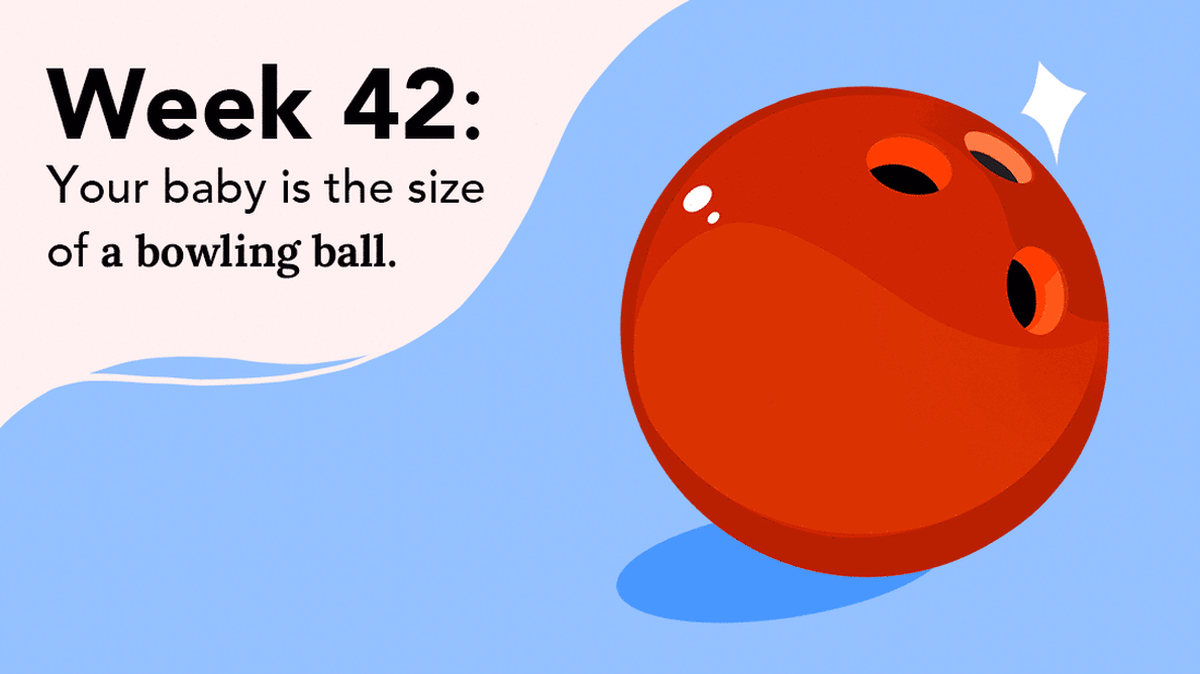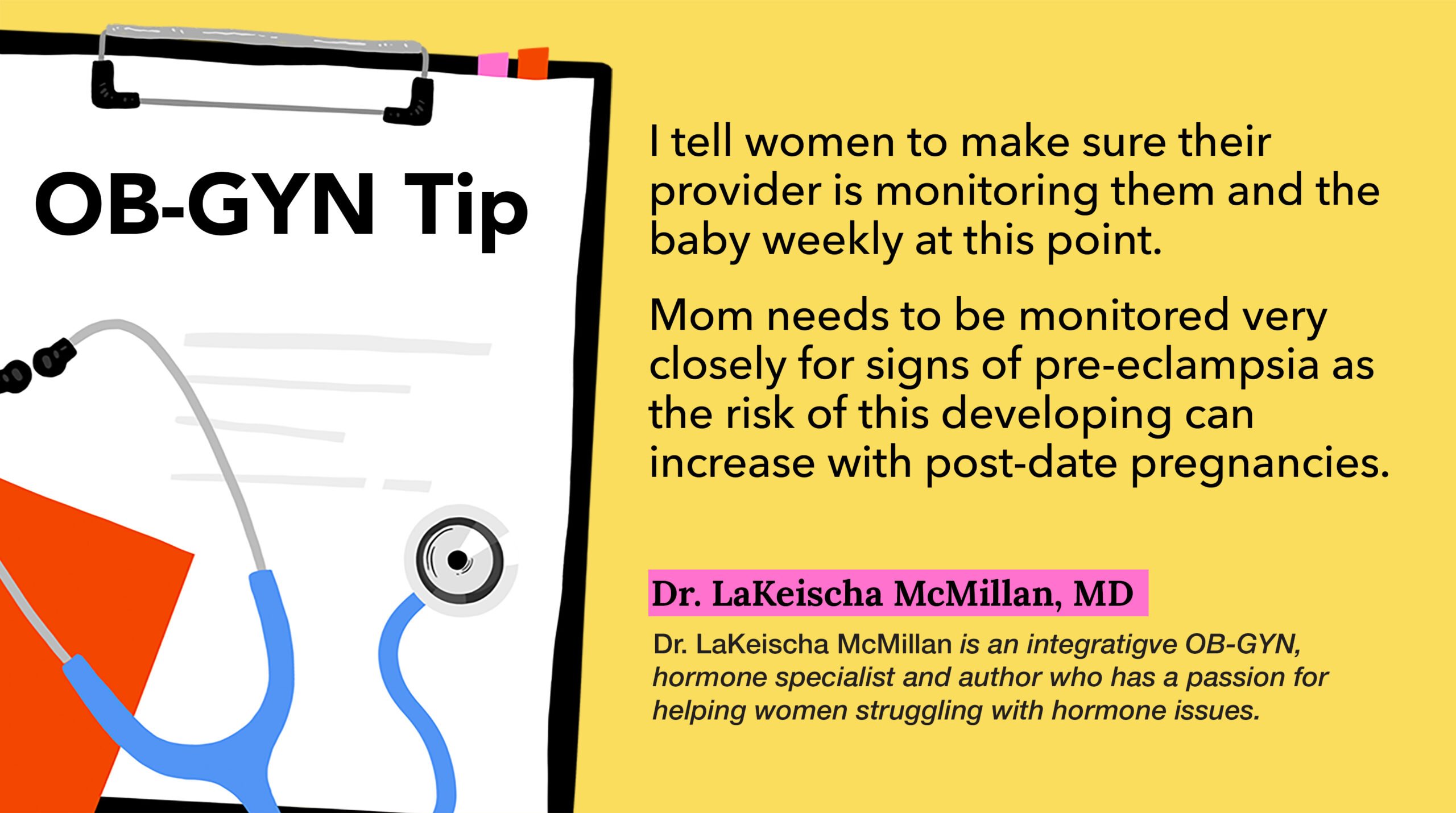
You’re 42 weeks pregnant!
If you’ve made it to 42 weeks, your baby is now the size of a bowling ball and measuring around 20 inches in length and about 8 lbs. You’re now in what is considered a post-term pregnancy and will likely be delivering any day now, whether you go into labor on your own or are induced. You’ve likely been ready to meet your little one for a while now but not to worry, there’s nothing wrong with going past your due date. Continue to monitor fetal movement and contact your doctor if you notice any significant changes.
Pregnancy symptoms at 42 weeks

Some pregnancy symptoms when 42 weeks pregnant include difficulty sleeping due to discomfort from back pain, leg cramping, and having to get up multiple times during the night to urinate. Because you’re post-term, you may also be feeling some anxiety and stress both about the arrival of your baby and the specifics of delivery.
Hemorrhoids
Your growing baby over the last several months has placed additional pressure on your uterus. This pressure often finds moms-to-be, running to the bathroom more often due to decreased bladder capacity. Unfortunately, hemorrhoids (swollen blood vessels around the anus) are another common occurrence during pregnancy. If you sit for long periods of time, consider a doughnut cushion to alleviate pressure and if you’re laying down, opt to lay on your left side to both increase blood throughout the body and relieve the discomfort of hemorrhoids.
Braxton Hicks Contractions
Braxton Hicks contractions tend to begin around the 20th week of pregnancy and continue right through to before delivery. Unlike true contractions before delivery, Braxton Hicks will ease with rest or hydration. Time your contractions and make note of how far apart they are. Once they have been going on for about an hour with five minutes between, it may be an indication that you’re actually in labor.
Anxiety
It is common to feel anxious and stressed during pregnancy, especially if you’ve gone past your due date and are awaiting the arrival of your little one. Spending time in quiet meditation and journaling your feelings can often help combat the regular pressures of motherhood but know that there’s nothing shameful about seeking help from your doctor or therapist if you’re having depression symptoms or prolonged anxiety.
What does 42 weeks equal in months?
At 42 weeks pregnant you’re just about 9.5 to 10 months along and considered in post-term pregnancy. Your baby will be here soon and soon you’ll be in the throes of the fourth trimester.
Your ultrasound
If you’ve made it to 42 weeks and you’ve not had one already, your doctor may order a non-stress test and ultrasound to check the baby’s vitals. Your ultrasound technician will also be checking amniotic fluid levels and your baby’s size to ensure everything is progressing as it should.
Your pregnant belly at 42 weeks

Determining the difference between Braxton Hicks contractions or the real deal is a challenge right now. Timing your contractions can help though. If contractions are consistent over the timeframe of an hour and come about five minutes apart, it may be time to head to the hospital.
Pregnancy tips at 42 weeks
You’ll be bringing baby home any day now, so be sure to tie up any loose ends. Schedule a self-care day for yourself at the nail salon or schedule a relaxing facial or get your hair trimmed.
Make sure your hospital bag has everything you think you may need. A pair of cozy socks, a brush, deodorant, comfy clothes for going home, and lip balm are a few last-minute items you can throw in your bag.
Your pregnancy checklist at 42 weeks
- If you’re sending out birth announcements, get them ready now so all you need to do once baby arrives and you’re settled in at home is add a photo and enter the birth details. Address envelopes and add stamps now to save yourself time later.
- Order any pre-packaged meals you may want for yourself and your family. Companies like Freshly and Hello Fresh offer complete meals that you simply have to warm up in the microwave, no prep needed.
What are you eating for you and your baby?

Continue to eat a well-balanced diet as you move into your 42nd week of pregnancy. Supplement with protein shakes (only if necessary) and stay hydrated, especially if you’re feeling the effects of Braxton Hicks contractions.
Try these protein-packed foods to keep your energy up:
- Cottage cheese
- Lentils or other legumes
- Nuts
- Salmon or chicken
- Brown rice or oatmeal
There are countless wives tales that offer advice on what to eat to induce labor and you may get advice from friends on what to eat, but if you’re unsure of the suggestions, especially certain teas, herbs and supplements, be sure to discuss them with your healthcare provider.
When to call your doctor
At 42 weeks pregnant, your doctor has likely discussed with you either inducing labor or a membrane sweep to help speed up labor. If you’re experiencing any major swelling of the feet, legs, and hands or have vision issues, be sure to call your healthcare provider right away.
Pregnant women are at a higher risk of illness as a result of a COVID-19 diagnosis and those diagnosed with COVID-19 have an increased chance of delivering pre-term (before 37 weeks), according to the Centers for Disease Control and Prevention.
Note: If you are visiting your doctor during COVID, be sure to confirm that the doctor’s office is following COVID protocols as indicated by the CDC.
Additional considerations — Transgender pregnancy
Justin S. Brandt, MD is the assistant clinical professor in the department of obstetrics, gynecology, and reproductive sciences at Rutgers Robert Wood Johnson Medical School. In a published literature review, Brandt and colleagues expressed the importance of proper medical care for pregnant transgender men who may experience depression or gender dysmorphia before and after delivery.
“We need more research, especially about the short-term and long-term impact of pregnancy on gender dysphoria. Providers need more experience managing transgender men during pregnancy, and we hope our study may be a helpful resource,” Brandt said in a recent Healio Psychiatry article.
*Disclaimer: The advice on Mom.com is not a substitute for consultation with a medical professional or treatment for a specific condition. You should not use this information to diagnose or treat a health problem without consulting a qualified professional. Please contact your health-care provider with questions and concerns.